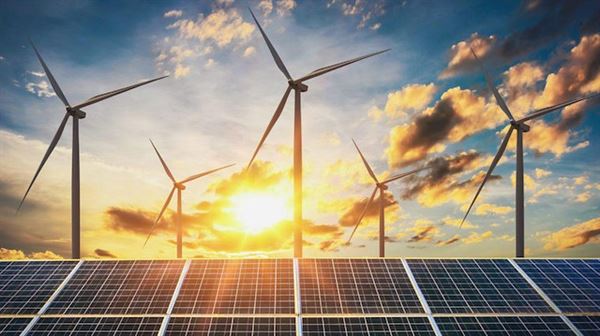Turkey produced 46% of its electricity from renewable resources during the first 10 months of 2019, Turkey's Energy and Natural Resources Minister Fat
Turkey produced 46% of its electricity from renewable resources during the first 10 months of 2019, Turkey’s Energy and Natural Resources Minister Fatih Donmez said Tuesday.
This 46% ratio represents a steady monthly increase, Donmez said during his speech at the 8th Turkish Wind Energy Congress held in Ankara.
Local and renewable energy resources combined saw a total share of 64% in electricity production in the January-October period of this year, marking a record high level, the energy minister said.
“With these figures, we reached our objective of producing two-thirds of our electricity in the short-term from local and renewable resources. Now, we aim to raise this ratio to higher levels,” Donmez said.
Currently, Turkey produces 8% of its electricity from wind energy but with increasing energy demand expected over the next three years due to economic growth, Turkey aims to raise this share to 10%.
“Our electricity production from wind energy rose 14.6% in October, from the same month last year, and increased approximately 70% in the last five years,” he said.
“We rank fifth in Europe in electricity production from wind energy,” the minister added.
Renewable energy resources have a 48% share of total installed capacity today. The total installed capacity of Turkey’s 262 wind farms, both licensed and unlicensed, has reached 7,500 megawatts, and represent an 8% share of total installed capacity, he noted.
“We rank 6th in Europe and 12th in the world in wind installed capacity,” he asserted.
Out of the target to reach 10,000 MW installed capacity from wind farms for the 2017-2027 period “1,500 MW has been completed, he confirmed.
The minister hailed the progress that has been made since 2008 when wind energy only had an installed capacity of 19 MW in 2002. He said that capacity rose to 364 MW in 2008, but soared to the current 7,500 MW, marking a 400-fold increase.
In the future, further additions will be made through mini renewable energy resource zones (YEKA) in Turkey and through solar energy power plants (GES) to add 40-50 MW, he said.
– First domestic production wind turbines to go online
“The winning consortium of our first wind YEKA tender is about to complete a factory that will have 400 MW per annum capacity and will use domestically produced or supplied components. It will shortly start manufacturing wind turbines, in which at least 65% of components will be domestic.”
Additionally, the factory will have a center for Research and Development (RD) in wind energy for 10 years employing 2,250 people, of which at least 90% will be local factory workers and at least 80% will be local workforce in RD.
Currently, the wind energy sector employs around 17,000 people but employment is expected to grow by 85% in the next five years, Donmez noted.
The minister concluded by explaining that Turkey has moved from a ‘build-operate-and transfer model’ to a ‘full integration model’ where wind energy technology is produced by domestic sources.
50,000 MW potential in wind
“Turkey meets 10% of its total energy needs from wind energy,” the Chairman of the Committee on Industry, Trade, Energy, Natural Resources, Information, and Technology of the Turkish Grand National Assembly, Mustafa Elitas, said.
However, he said that the country is only reaching a fraction of its potential.
“Turkey has wind energy potential of 50,000 MW. Over the last 10 years, our installed capacity has increased to reach approximately 8,000 MW today. This will further increase in the following years,” he asserted.
Turkey has focused on increasing the share of local energy resources, such as coal, wind, hydroelectricity and geothermal in its energy portfolio applying sustainable and environmentally friendly production processes.
“The world’s population will reach 9.2 billion by 2040, and global energy consumption will increase 28% by then,” Elitas said, in explanation for the need to expand production.
